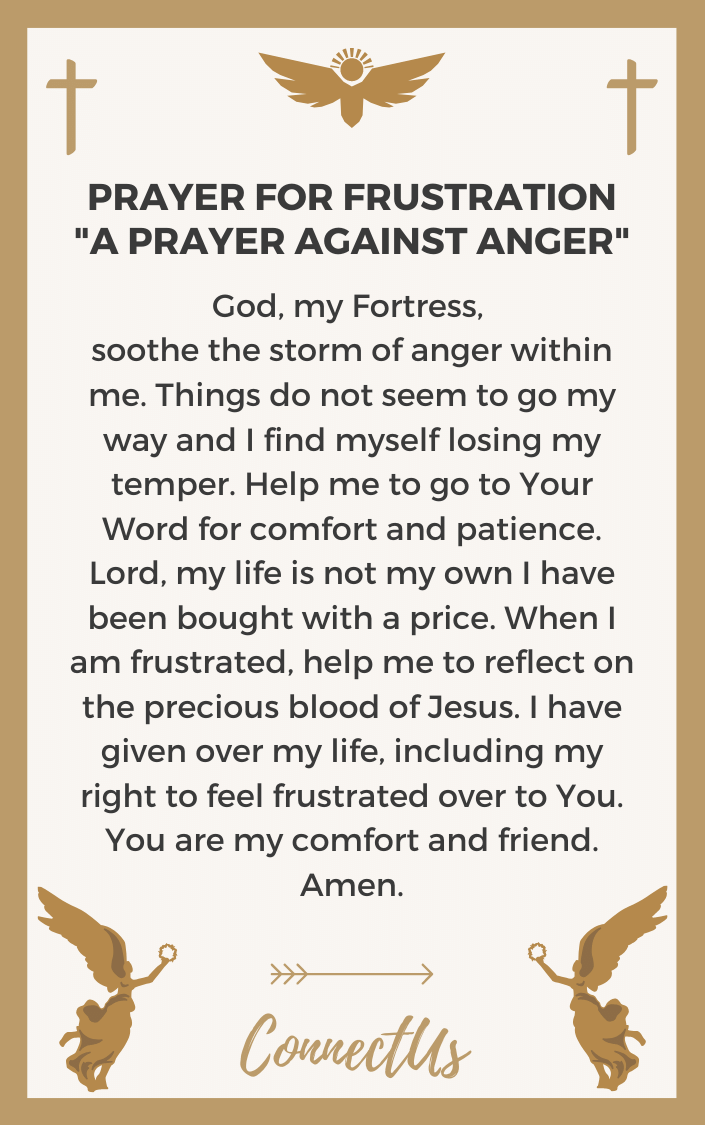Prayers for Overcoming Anger and Resentment
Anger is something we all experience from time to time. It’s a natural and necessary emotion, but when it builds up and becomes resentment, that’s when problems start to happen. In this article, we’re going to offer up some prayers for overcoming anger and resentment. Anger and resentment can be destructive; they can lead to conflict and tension in both personal and professional relationships. Prayers can help us deal with our anger in a healthy way, so that we can move forward in our lives without regrets. If you find yourself struggling with anger or resentment, prayer may be the answer you need. Read on to learn more about how to pray for overcoming these emotions.
Anger is Normal
Anger is normal. It’s an emotional response to a situation that feels challenging or threatening.
When we experience anger, it can feel like our heart is racing, our breathing is shallow, and our body is tense. Our brain may release hormones like adrenaline and cortisol in response to the anger. These hormones can make us feel alert and motivated, but they can also increase our energy level and distract us from other tasks.
It’s important to remember that anger isn’t always bad. It can be helpful when it motivates us to take action in the face of a challenge or threat. And sometimes anger can be a sign that we’re feeling frustrated or upset about something.
In spite of its usefulness, however, anger can occasionally be destructive. When uncontrolled, it can lead to violence or other harmful behavior. It can also damage relationships with loved ones and coworkers.
If you struggle with anger often, there are several things you can do to try to manage it:
1) Recognize when you’re feeling angry and try to identify the reason why the situation has triggered your anger. This will help you better understand your emotions and how best to respond.
2) Talk about your feelings with someone you trust – a friend, family member, therapist, or clergy person. talking about how you’re feeling helps reduce the intensity of the emotion and may even help resolve the underlying issue that’s leading to
Anger is Destructive
Anger is destructive because it can lead to negative emotions such as resentment and bitterness. When anger is expressed in a negative way, it can fuel feelings of animosity towards others or ourselves.
Anger also disrupts our ability to think clearly and make sound decisions. It can lead us to lash out at those around us, or act on impulse without thinking things through. In extreme cases, anger can even lead to violence.
Fortunately, there are ways to overcome anger and resentments. First, we need to recognize that anger is often a response to feeling overwhelmed or frustrated. Once we understand why we’re angry, we can start to control our thoughts and emotions instead of letting them control us.
Prayers can also be very helpful in overcoming anger and resentments. Prayer helps us connect with God andallows Him to help us work through our problems. We can also pray for forgiveness for our actions, which will help us move forward from the situation healthier than before.
Anger is Preventable
Anger is preventable. If you want to avoid anger, here are a few tips:
1. Identify the Root Cause of Your Anger.
The first step to preventing anger is identifying its root cause. Is your anger stemming from a situation that’s actually happening, or is it based on something that’s going on in your head? If the anger is based on something that’s going on in your head, then you can work to address that issue by talking to a therapist or counselor about it.
2. Recognize and Respond to Warning Signs of Anger.
If you notice any warning signs of anger, like getting irritated easily, becoming verbally aggressive, or feeling tense and angry all the time, take caution and try to calm down before things get out of hand. Recognizing these warning signs will help you respond appropriately in order to avoid getting too angry.
3. Be Patient and Allow Yourself Time Tocool Off After an Angry outburst.
Sometimes when we’re angry our tempers just flare up really quickly and we end up reacting in an uncontrolled way. If this happens to you, try taking some time after getting upset to cool off by resting or doing something calming (like reading). This will help prevent future episodes of anger from occurring.
Anger and Resentment are Two Sides of the Same Coin
Anger is a feeling of strong irritation and anger. Resentment is a feeling of strong dislike or hostility toward someone or something. Anger and resentment are two sides of the same coin. Both can lead to destructive behaviors.
Anger can be sparked by any number of things: frustration, boredom, fear, and insecurity. Resentment becomes a problem when it’s directed at others instead of self-improvement. It’s important to remember that anger and resentment are both emotions, but they’re not always positive ones. When anger boils over into resentment, it can cause problems in relationships and work environments.
If you struggle with anger or resentment, it might be helpful to talk to someone about it. There are many resources available to help people overcome these emotions.
Ways to Overcome Anger and Resentment
1. Pray for guidance and strength to overcome the anger and resentment that is holding you back.
2. Write out your anger and resentment in a journal, then read them over and identify why they are affecting you so much.
3. Spend time with people who make you happy, or who bring up positive memories from your past.
4. Connect with nature by going for a walk, hiking, or taking a nature hike; this will help you focus on the present moment and take some deep breaths.
5. Practice yoga or meditation to help ease your mind and body; both of these practices can have a profound impact on how you feel emotionally.
Summary
Anger and resentment are two emotions that can be tough to overcome. It can be difficult to let go of the anger we feel when we experience an injustice or when someone wrongs us, but it is ultimately necessary if we want to move forward in our lives. When we pray for guidance, we are asking for help in overcoming these emotions. The following prayer may be helpful in getting you started: “Dear God, Thank you for giving me the ability to understand and forgive those who have hurt me in the past. Please give me the wisdom and strength to not let their actions define who I am as a person, and help me to progress towards my goals without letting their past hold me back.”






